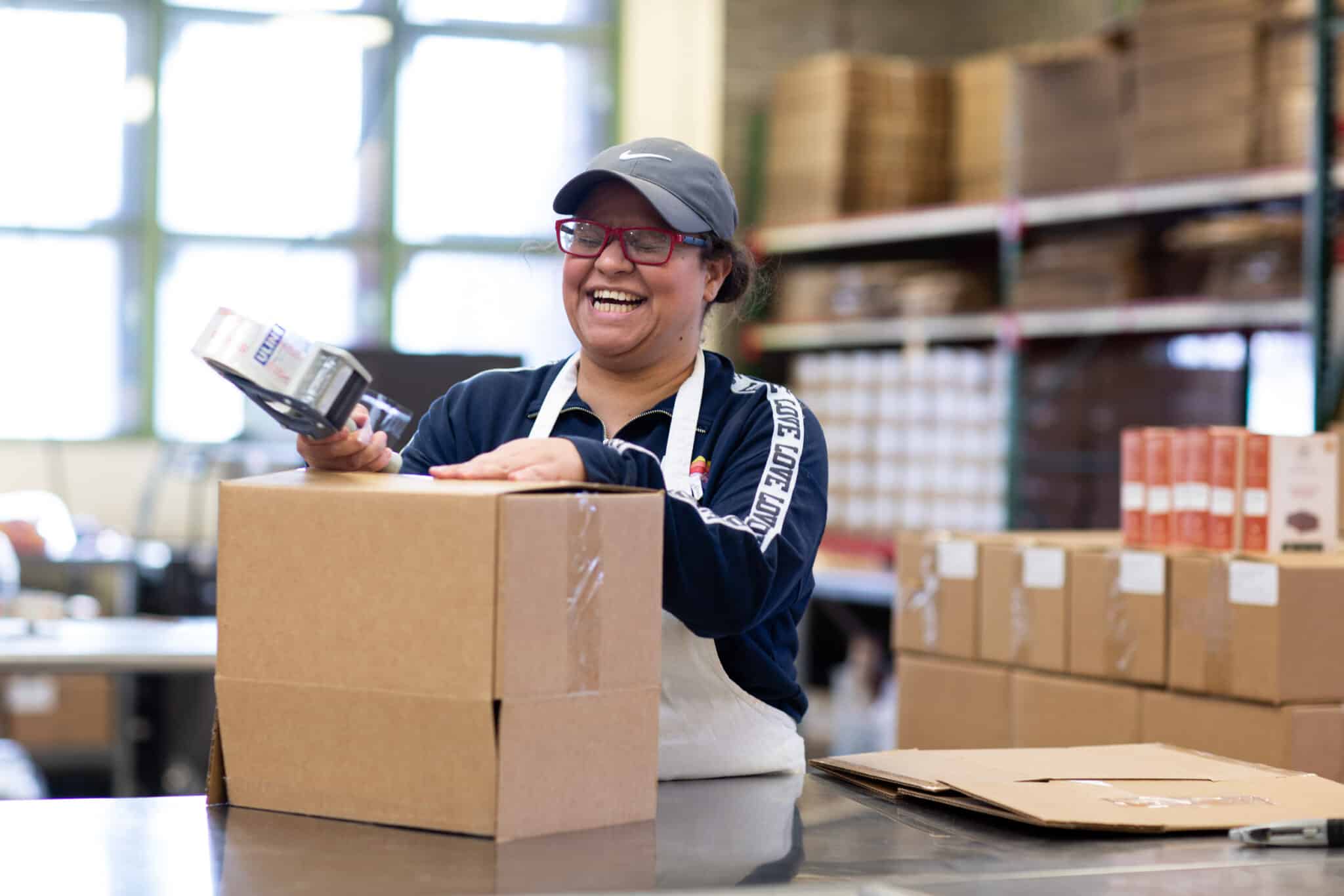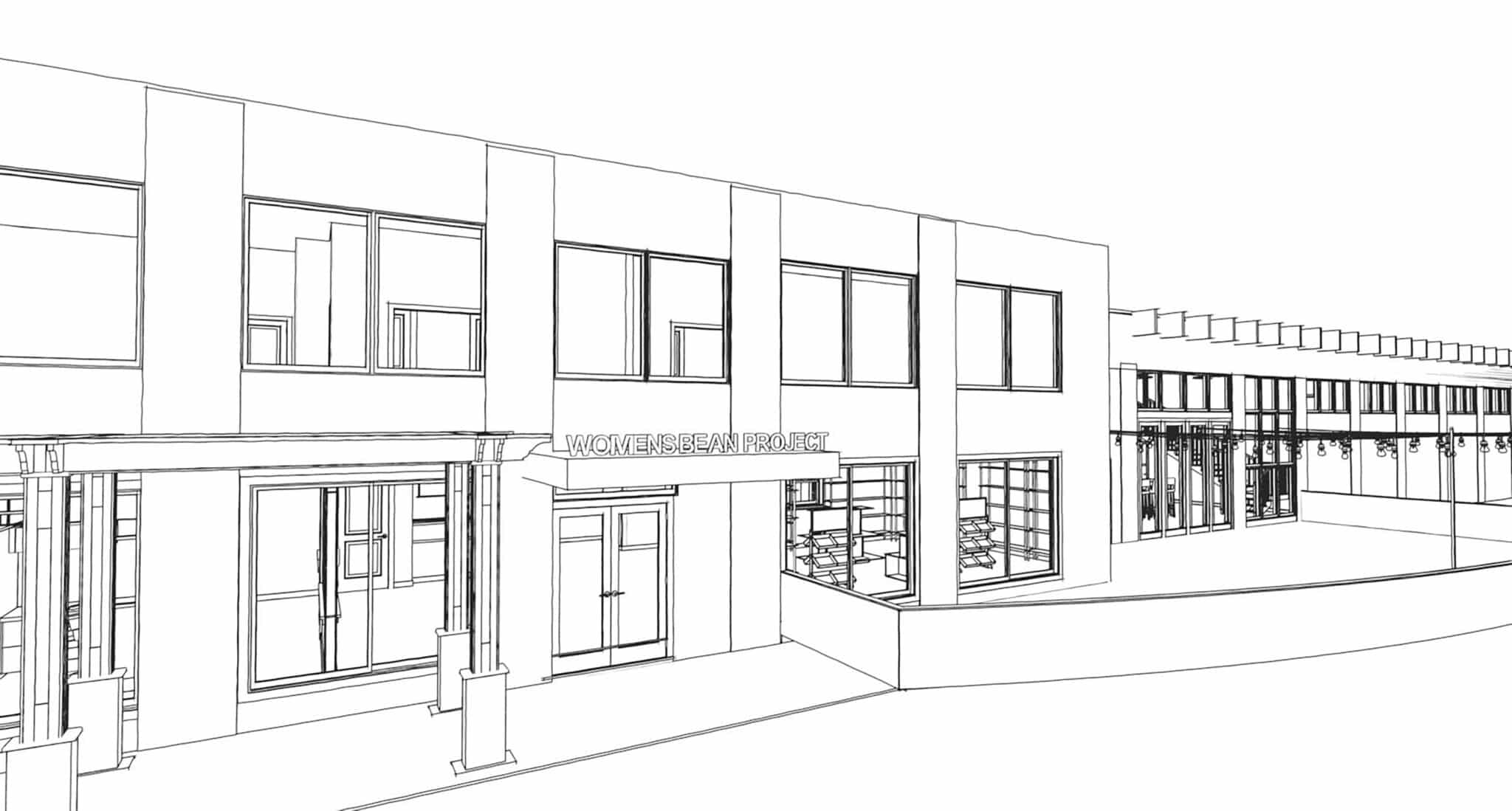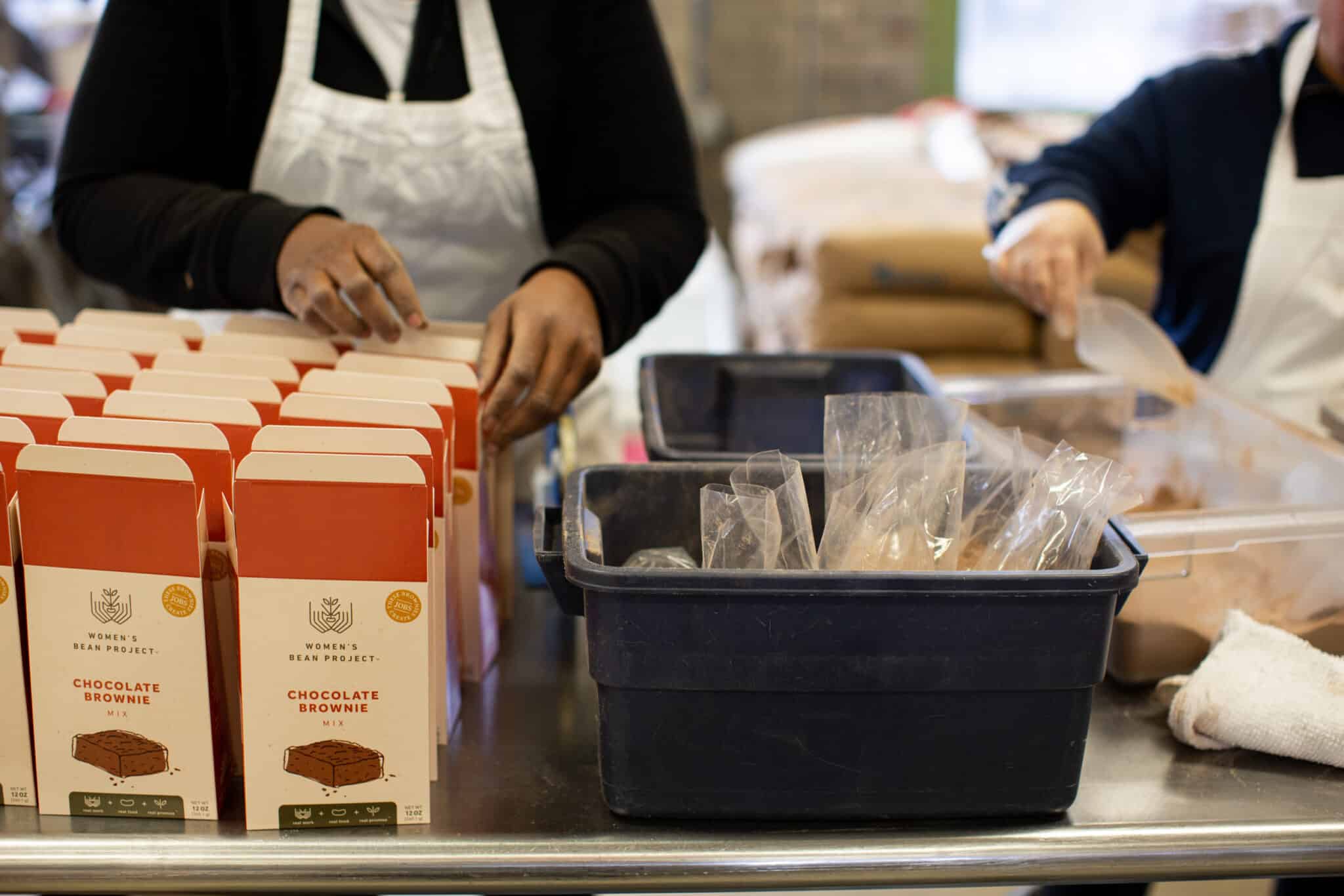
Women’s Bean Project hires around 60 women each year to manufacture and package food products. (Photos courtesy of Women’s Bean Project)
It’s time for the Women’s Bean Project to put down roots in a new part of Denver.
After nearly 30 years in Curtis Park, the job-training nonprofit for women bought a former used car dealership in Athmar Park to manufacture and package food products for sale at stores around the country.
“Every business decision we make and all of our programming is affected by the amount of space we have, and that’s how you know you’re out of space — when you can’t make decisions to grow or to change because of building constraints,” said CEO Tamra Ryan, who has been with nonprofit for 18 years.
In June, the organization, which hires women who struggle to find work — 85 percent of the program’s participants have felonies — plans to double its space and move into a new production facility at 1300 W. Alameda Ave. in Athmar Park.
Ryan, 57, said Women’s Bean Project plans to do a $2.8 million renovation. The nonprofit has hired William Brummett Architects to design the space and Palace Construction to complete the build out, which will include a 4,500-square-foot addition.
Women’s Bean Project hires around 60 women on average each year to manufacture and package dry goods for a six to nine-month period, so they can learn the skills necessary for mainstream employment.
The nonprofit’s products are sold in nearly 1,000 retailers around the U.S., including King Soopers, Whole Foods and Safeway, and on the Amazon website. It has an average annual revenue of $2.5 million, Ryan said.
The most popular item is the 10-bean soup mix.
The new dry goods production facility will give Women’s Bean Project more room to add production lines.
“We can make and package more than one product at a time, unlike our current facility, where we have to reset with each new product,” Ryan said.
The nonprofit purchased its current location at 3201 Curtis St. in Curtis Park in 1995 for $185,000, according to property records, and opened that same year. Mainspring, led by Fiona Arnold, is under contract to purchase the building, Ryan said. Mainspring developed the RiNo retail complex Backyard on Blake and has plans to build a five-story hostel at 3030 Welton St. in Five Points.
Women’s Bean Project’s current 10,000-square-foot space has two production lines to make and package its 50 products, including baking mixes, soup mixes, popcorn and spices. The women are involved from start to finish, including helping receive the raw materials, packaging them with filler machines, sealing the products and shipping them out.
The organization had been looking to grow into a larger space for a few years. Last year, when the nonprofit found their new property and saw it sat on 2.5 acres, Ryan realized that it was more than she needed.
“It would be perfect for affordable housing and having affordable housing next door to Women’s Bean Project would also be ideal,” Ryan said.
So, the nonprofit presented the idea to Denver Housing Authority, which bought the building and surrounding land for $4 million in May 2020, according to property records.
Denver Housing Authority has contracted Warren Village to build 74 apartments, a learning center, playgrounds and a community garden adjacent to Women’s Bean Project’s new facility.
And in November 2021, Women’s Bean Project purchased the 15,500-square-foot building, plus its parking lot, from DHA for $2.5 million, according to property records.
The new facility will have an office to support the nonprofit’s human services programming, including a space for healthcare and mental health providers to visit, plus phone booths, small meeting rooms and a computer lab, where program participants can use laptops for job searches or resume writing.
Women’s Bean Project has raised $6.2 million to fund the move and still has $300,000 left of its $6.5 million goal to get the space up and running, Ryan said.
In addition to expanding its production, the nonprofit wants to expand its outreach, Ryan said.
In the first year, Women’s Bean Project plans to hire 15 more women for the extra space, and eventually, by the third year, Ryan said, it will be able to add 40 more women.
The typical employee hasn’t had a job longer than a year, often because of addiction, domestic violence or incarceration. Ryan said 85 percent of the women have had a felony. The average age of the women is 38, and they’re paid $15.87 an hour.
For 70 percent of their time with Women’s Bean Project, they’re working in the business and learning basic job skills, and for the other 30 percent, they’re in computer classes, learning how to interview, updating their resumes or getting help finding a permanent job.
“We don’t just want to grow our business to serve more women, but we also want to make sure when we do that, everything we do serves them in a better way to help them move on to employment in the community,” Ryan said.

Women’s Bean Project hires around 60 women each year to manufacture and package food products. (Photos courtesy of Women’s Bean Project)
It’s time for the Women’s Bean Project to put down roots in a new part of Denver.
After nearly 30 years in Curtis Park, the job-training nonprofit for women bought a former used car dealership in Athmar Park to manufacture and package food products for sale at stores around the country.
“Every business decision we make and all of our programming is affected by the amount of space we have, and that’s how you know you’re out of space — when you can’t make decisions to grow or to change because of building constraints,” said CEO Tamra Ryan, who has been with nonprofit for 18 years.
In June, the organization, which hires women who struggle to find work — 85 percent of the program’s participants have felonies — plans to double its space and move into a new production facility at 1300 W. Alameda Ave. in Athmar Park.
Ryan, 57, said Women’s Bean Project plans to do a $2.8 million renovation. The nonprofit has hired William Brummett Architects to design the space and Palace Construction to complete the build out, which will include a 4,500-square-foot addition.
Women’s Bean Project hires around 60 women on average each year to manufacture and package dry goods for a six to nine-month period, so they can learn the skills necessary for mainstream employment.
The nonprofit’s products are sold in nearly 1,000 retailers around the U.S., including King Soopers, Whole Foods and Safeway, and on the Amazon website. It has an average annual revenue of $2.5 million, Ryan said.
The most popular item is the 10-bean soup mix.
The new dry goods production facility will give Women’s Bean Project more room to add production lines.
“We can make and package more than one product at a time, unlike our current facility, where we have to reset with each new product,” Ryan said.
The nonprofit purchased its current location at 3201 Curtis St. in Curtis Park in 1995 for $185,000, according to property records, and opened that same year. Mainspring, led by Fiona Arnold, is under contract to purchase the building, Ryan said. Mainspring developed the RiNo retail complex Backyard on Blake and has plans to build a five-story hostel at 3030 Welton St. in Five Points.
Women’s Bean Project’s current 10,000-square-foot space has two production lines to make and package its 50 products, including baking mixes, soup mixes, popcorn and spices. The women are involved from start to finish, including helping receive the raw materials, packaging them with filler machines, sealing the products and shipping them out.
The organization had been looking to grow into a larger space for a few years. Last year, when the nonprofit found their new property and saw it sat on 2.5 acres, Ryan realized that it was more than she needed.
“It would be perfect for affordable housing and having affordable housing next door to Women’s Bean Project would also be ideal,” Ryan said.
So, the nonprofit presented the idea to Denver Housing Authority, which bought the building and surrounding land for $4 million in May 2020, according to property records.
Denver Housing Authority has contracted Warren Village to build 74 apartments, a learning center, playgrounds and a community garden adjacent to Women’s Bean Project’s new facility.
And in November 2021, Women’s Bean Project purchased the 15,500-square-foot building, plus its parking lot, from DHA for $2.5 million, according to property records.
The new facility will have an office to support the nonprofit’s human services programming, including a space for healthcare and mental health providers to visit, plus phone booths, small meeting rooms and a computer lab, where program participants can use laptops for job searches or resume writing.
Women’s Bean Project has raised $6.2 million to fund the move and still has $300,000 left of its $6.5 million goal to get the space up and running, Ryan said.
In addition to expanding its production, the nonprofit wants to expand its outreach, Ryan said.
In the first year, Women’s Bean Project plans to hire 15 more women for the extra space, and eventually, by the third year, Ryan said, it will be able to add 40 more women.
The typical employee hasn’t had a job longer than a year, often because of addiction, domestic violence or incarceration. Ryan said 85 percent of the women have had a felony. The average age of the women is 38, and they’re paid $15.87 an hour.
For 70 percent of their time with Women’s Bean Project, they’re working in the business and learning basic job skills, and for the other 30 percent, they’re in computer classes, learning how to interview, updating their resumes or getting help finding a permanent job.
“We don’t just want to grow our business to serve more women, but we also want to make sure when we do that, everything we do serves them in a better way to help them move on to employment in the community,” Ryan said.



